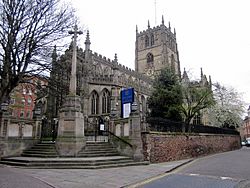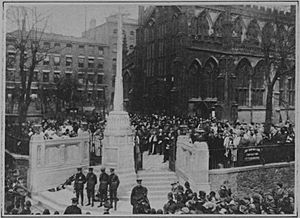County War Memorial, Nottingham facts for kids
Quick facts for kids County War Memorial, Nottingham |
|
|---|---|
| United Kingdom | |
 |
|
| For Men of Nottingham who died in the First World War. | |
| Unveiled | 20 April 1922 |
| Location | 52°57′03″N 1°08′38″W / 52.950875°N 1.143851°W |
| Designed by | Cecil Greenwood Hare |
The County War Memorial, Nottingham is a special monument in Nottingham, England. It is a Grade II listed structure, which means it's an important historical building. This memorial helps us remember the brave people from Nottingham who gave their lives in the First World War.
Contents
The Nottingham War Memorial's Story
Who Designed and Unveiled It?
The war memorial was designed by a person named Cecil Greenwood Hare. He was the architect who created its look.
It was officially shown to the public on April 20, 1922. A local leader, George Monckton-Arundell, 7th Viscount Galway, helped unveil it. He was in charge of the Nottinghamshire County Council at the time. A religious leader, the Bishop of Southwell, Edwyn Hoskyns, also took part in the ceremony.
Why Was This Memorial Created?
This memorial was built using money donated by many people. It was created to honor the 11,000 men from Nottingham and Nottinghamshire who died during the First World War. This was a very big war that happened from 1914 to 1918.
The memorial stands at the entrance of St Mary's Church, Nottingham. This is where High Pavement and St Mary's Gate roads meet.
What Does the Memorial Look Like?
The memorial is a tall cross made of Whitby stone. It stands about 29 feet (9 meters) high. On the cross, there is a bronze sword. The base of the cross is shaped like an octagon with steps. There is also a special tablet with words written on it.
On both sides of the memorial, there are steps leading up. At the top of these steps, there are two gates. Along the sides of the steps, there are walls with square pedestals. These pedestals have iron lanterns on top. The walls also have tablets with the names of different towns and villages from the city and county.
The pillars next to the gates have more tablets. These tablets show the names of men and women from St Mary's parish who died in the First World War.
Keeping the Memorial Strong
In 2008, the memorial was repaired and made strong again. New panels with names and information were also added during this restoration.
 | Janet Taylor Pickett |
 | Synthia Saint James |
 | Howardena Pindell |
 | Faith Ringgold |


